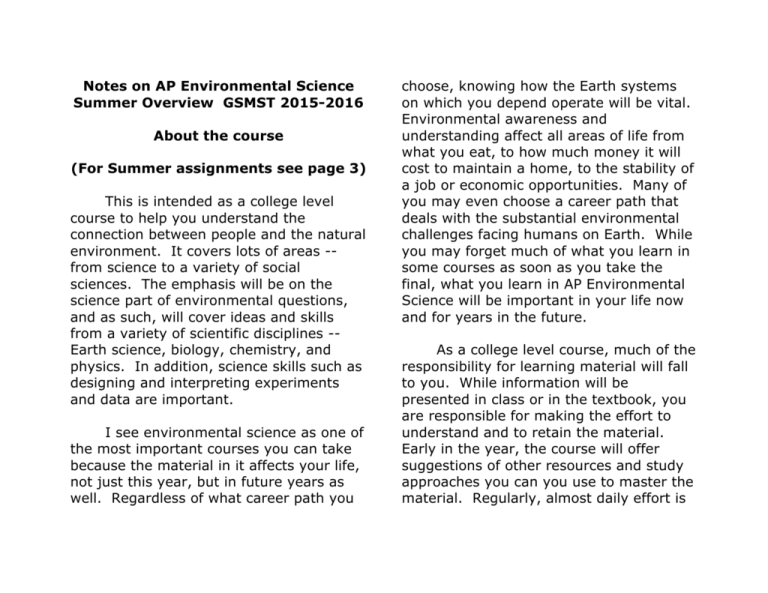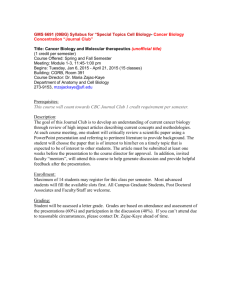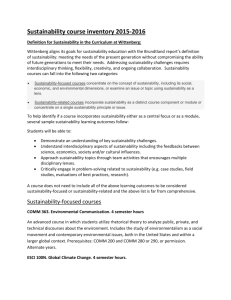Notes on AP Environmental Science 2015 Summer
advertisement

Notes on AP Environmental Science Summer Overview GSMST 2015-2016 About the course (For Summer assignments see page 3) This is intended as a college level course to help you understand the connection between people and the natural environment. It covers lots of areas -from science to a variety of social sciences. The emphasis will be on the science part of environmental questions, and as such, will cover ideas and skills from a variety of scientific disciplines -Earth science, biology, chemistry, and physics. In addition, science skills such as designing and interpreting experiments and data are important. I see environmental science as one of the most important courses you can take because the material in it affects your life, not just this year, but in future years as well. Regardless of what career path you choose, knowing how the Earth systems on which you depend operate will be vital. Environmental awareness and understanding affect all areas of life from what you eat, to how much money it will cost to maintain a home, to the stability of a job or economic opportunities. Many of you may even choose a career path that deals with the substantial environmental challenges facing humans on Earth. While you may forget much of what you learn in some courses as soon as you take the final, what you learn in AP Environmental Science will be important in your life now and for years in the future. As a college level course, much of the responsibility for learning material will fall to you. While information will be presented in class or in the textbook, you are responsible for making the effort to understand and to retain the material. Early in the year, the course will offer suggestions of other resources and study approaches you can you use to master the material. Regularly, almost daily effort is expected, and frequent review will help you deal with cumulative nature of this material. One value of college courses is helping you establish the skills and mindset necessary to be a life-long learner. This class lacks the time to cover all the topic areas in the depth that each should deserve. For example, some topics form the entirety of a semester or more college program, and the AP course may have time to spend three to five days on it. To help with this, each student will be expected to become our class expert on a topic for each semester. The expert will prepare additional information to present to the class as one of your assignments. I plan on breaking the year into to two divisions that will coincide roughly with the semesters. One semester, currently planned for the fall, will look primarily at the non-living side of Earth – planetary processes, the atmosphere, water supply, energy and materials supply and use. The other semester, spring, will look at the living side – population ecology (human and other), ecological issues and pressures, health related to environmental considerations, and food supply. As you will see, environmental topics cannot be neatly packaged into any one box. For example, while you may think of food production as something that comes from living organisms, climate, soil, and energy availability heavily influence how much food can be produced. I mention this information now because you may want to take your own interests into consideration as you look at your summer assignment and later decide you expert role for each semester. This course is an Advanced Placement course. This means certain topics are required by the College Board that manages the AP program. You may find it helpful to review the AP Environmental Science course outline from time to time. Use this link, http://apcentral.collegeboard.com/apc/pub lic/repository/ap-environmental-sciencecourse-description.pdf and pay attention to pages 4-10. The course you are taking will not follow this outline in numerical sequence, but all the topics will be covered. In addition, an AP course has an exam. The AP Environmental Science exam is scheduled for Monday, 2 May 2016. Much more will be said about the exam in class throughout the year. If you complete the work in the course with appropriate diligence, I predict most of you will be well prepared for the exam. Please keep in mind that the importance of environmental understanding goes much beyond how you do on 100 multiple choice questions and four free response questions. I look forward to meeting you and sharing my interest in the environment with you in the upcoming school year. Summer assignment Quick description 1) Read one book from one of the following main categories of environmental topics: Non-living Earth – resources, geology, weather or climate, energy, chemistry; Living Earth – environmental health, ecology or population biology, ecosystems management or key species biology, food production; Politics or economics related to the environment. For the book, you will need to complete the information on the book report form; see book report form with the summer assignment. This is a good assignment to get started on now so you can choose a book of interest and get it done before summer is over. 2) Watch HOME,(HomeProject, YouTube) https://www.youtube.com/watch?v=jqxEN MKaeCU complete the question sheet (see attached) to help you remember what was covered. Not all the questions may be covered in the 93 minute commonly accessed version. You will be able to use this note sheet for the HOME quiz first week of school. I suggest doing this closer to school so it will be fresh in your mind. 3) Complete review of math needed to succeed in Environmental Science. This is a separate file in the summer assignment section. Summary – related to your interests As I mentioned above, the course lacks the time to pursue some topics in appropriate depth. Moreover, one of my goals is for you develop an in-depth knowledge of some topic that might become a possible senior capstone experience or something you can pursue in college. Consequently, I am giving you some choice in your summer work. During the school year, you will need to read one non-fiction environmentally related book for each semester. I strongly encourage you to finish the first book during the summer, as this book will need to be read by September 18. Should you want to read a second book in the summer to save you time in the spring semester, please send me (Thomas_Wellnitz@gwinnett.ga.us.k12) your choice because I have a limit on how many people can read the same book. The second semester book will involve a group sharing process. If you have an area of particular interest for which you might like to learn more and to serve as a class expert, send me a note, and I can send you some ideas of what you could do in the summer if you want to get started without the demands of other classes.






